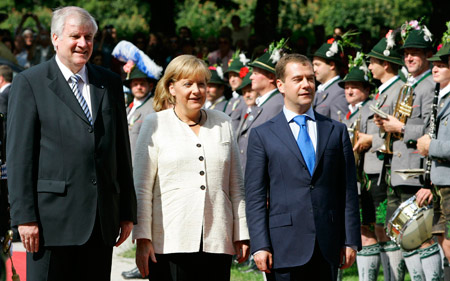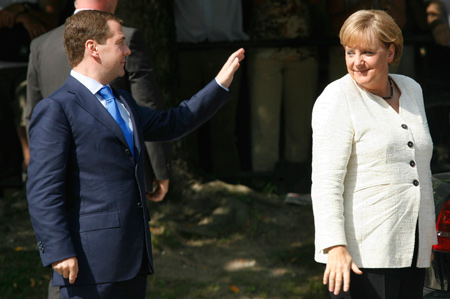German Chancellor Angela Merkel and visiting Russian President Dmitry Medvedev on Thursday agreed on a series of issues to strengthen cooperation between their countries.
 |
|
Bavarian state premier Horst Seehofer, German Chancellor Angela Merkel and Russia's President Dmitry Medvedev (L-R) stand in front of traditional dressed Bavarian shooters during a reception at the Munich residence July 16, 2009.Medvedev and Merkel participate in Russian-German high-level consultations, the so called "Petersburg Dialogue".[Xinhuanet.com] |
The two leaders held one-to-one talks at Schleissheim Palace, a former summer residence of Bavarian rulers to the north of Munich, the Bavaria state capital, while ministers from the two countries joined in the talks at a plenary session later in the day.
Both leaders agreed to cooperate more closely in tackling the current economic crisis, take further steps toward a new climate change deal, as well as coordinate foreign policies toward hot spots in the world like Iran and the Korean Peninsula nuclear issue.
Medvedev said the economic crisis is not over and the only way to overcome it is to create a cooperation framework.
The two leaders showed their support for the Opel takeover bid led by Canadian car parts manufacturer Magna, which was partially financed by Russian state-owned Sherbank.
Merkel said Magna's proposals created an excellent foundation, but also stressed that there were still many problems needed to be solved.
Medvedev said the leaders view the project "with great interest and optimism."
Before the meeting, analysts have expected that seeking reliable gas supply from Russia to Germany would be a top issue to be discussed by the two leaders, as Merkel wants to make sure that the gas crisis in January does not happen again.
As the EU and Turkey signed a new gas pipeline agreement aimed at bypassing Russia to provide energy to Europe, both leaders wanted to diffuse the conflict aroused by this Nabucco gas pipeline agreement.
Merkel said the Nord Stream pipeline was strategically important and necessary and the two programs were complementary. Medvedev responded that the Nord Stream pipeline would strengthen energy security across Europe.
 |
|
Russia's President Dmitry Medvedev (L) waves as German Chancellor Angela Merkel turns around during a reception at the Munich residence July 16, 2009.[Xinhuanet.com] |
Moreover, ministers from the two countries reached a deal for Siemens to deliver trains to Russia, while Frankfurt Airport's operator Fraport will participate in the expansion of St. Petersburg airport.
The German federal development bank KFW also promised 500 million euros (about 700 million U.S. dollars) to safeguard German exports to Russia during the financial crisis.
Russian and German ministers also agreed to improve cooperation against crime and terrorism and create a joint energy agency.
The German interior ministry said both parties decided to formalize a joint approach against terrorism, cyber crime and drug smuggling in Afghanistan.
Medvedev also invited Merkel to visit Russia's Black Sea resort city of Sochi in August. Both leaders attended the closing session of the so-called Petersburg Dialogue between civil society representatives from both countries in Munich.
(Xinhua News Agency July 17, 2009)